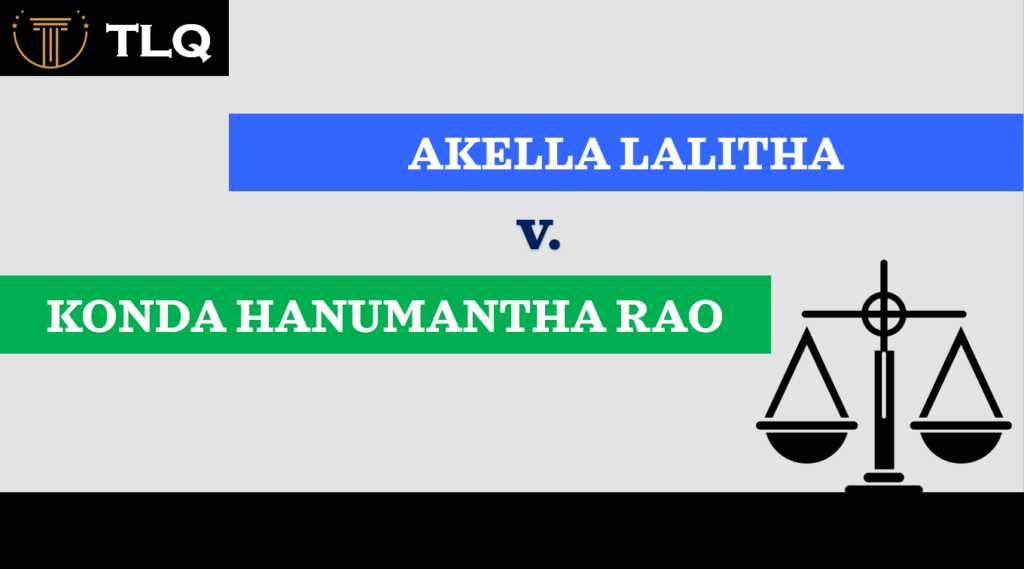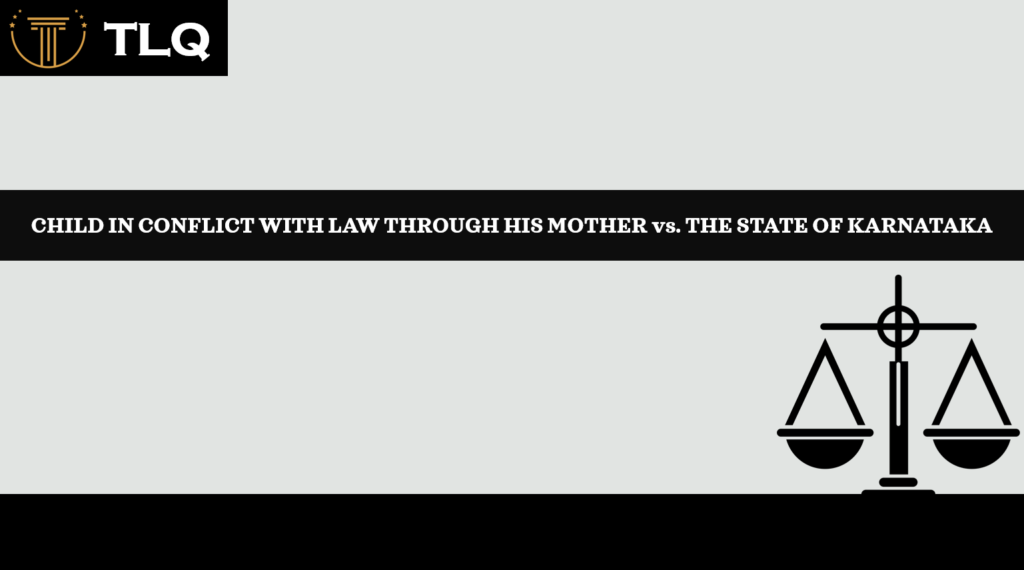Published On: 20th April, 2024
CASE NAME: AKELLA LALITHA VS KONDA HANUMANTHA RAO
APPELLANT: MRS. AKELLA LALITHA
RESPONDENT: SRI KONDA HANUMANTHA RAO & ANR.
CIVIL APPEAL NOS. 6325-6326 OF 2015
DATE OF JUDGMENT: 28 JULY, 2022
BENCH: CHIEF JUSTICE, KRISHNA MURARI, HIMA KOHLI
COURT: SUPREME COURT OF INDIA
CASES INVOLVED: Githa Hariharan and Ors. vs. Reserve Bank of India and Ors., Messrs. Trojan & Co. Ltd. vs. Rm.N.N. Nagappa Chetiar, Bharat Amratlal Kothari & Anr. Vs. Dosukhan Samadkhan Sindhi & Ors.
INTRODUCTION:
The common family name that an individual shares with their relatives is referred to as their surname. It is not appropriate to understand it only in terms of one’s heritage, culture, or history. Rather, we have to concentrate on its function in societal reality and in fostering a feeling of inclusion among kids. Patriarchy has been in our culture and laid the groundwork for our civilization since the beginning of time. As a result, there is now a dominant father’s surname in society and an undesirable gender power dynamic. But we must consider a mother’s rights in this context and make sure that our laws reflect those rights.
FACTS:
The Appellant, Mrs Akella Lalitha (mother) married Konda Balaji, the son of the defendants, on December 18, 2003. A child was born out of wedlock on March 27, 2006. However, the appellant’s husband passed away three months later on June 14, 2006. The offspring of Lalitha was only two and a half months old at that time. A year later, the appellant married Sri Akella Ravi Narasimha Sarma, an IAF Wing Commander, on August 26, 2007. The couple had a child out of wedlock and they currently live together. Master Ahlad Achintya, the child of Lalitha’s first marriage is currently a minor, aged 16 years and 4 months.
On April 9, 2008, the respondents petitioned under Section 10 of the Guardian and Wards Act, 1890 to be appointed as Guardians of the appellant’s son, Master Ahlad Achintya. When the petition was filed, the kid was around 2 years old, and the respondents prayed as follows:
- To designate petitioners as guardians for Ahlad Achintya, a 2-year-old minor child.
- To give privileges to visit Ahlad Achintya for the young child awaiting disposition of O.P.
- For costs of the petitioner, and
- For other relief or reliefs that the Hon’ble Court may provide as additional remedies based on the facts and in the interest of justice.
The Trial Court rejected the respondents’ petition on September 20, 2011, stating that it would be inappropriate to separate the youngster from his mother’s love and devotion. The Trial Court considered the elderly age of the Respondent grandparents. The court granted the respondents visitation rights and ordered the Appellant and her husband to bring their child to her parents’ house in Hyderabad once every three months, preferably during Dussehra, Deepavali, and Sankranthi festivals, as well as during school vacations. Respondents may visit their grandchild for two days, from sunrise to dusk.
Both parties appealed the Trial Court’s order to the High Court. During the arguments, the High Court learned that the child’s surname had changed from Konda to Akella. The High Court issued a common decision on the petition on January 24, 2014, with the following directions:
- The Appellant, Akella Lalitha, is the natural guardian of the kid. However, they must bring the child to the respondents’ house for a 2-day winter break. The respondents are also entitled to see the kid in the Appellant’s household, with prior intimation.
- The Appellant must restore the child’s surname and father’s surname within three months after receiving a copy of this ruling.
- When possible, the natural father’s name should be disclosed in the paperwork. Otherwise, Ravi Narasimha Sarma should be listed as the child’s stepfather.
The appellant, dissatisfied with the decision of the High Court judgment challenged the judgment in the current appeals in Supreme Court with the following issues.
ISSUES:
- After the death of the original father, the woman might choose the child’s surname. Can she give him the surname of her second husband, whom she remarried after her first husband’s death, and give the kid for adoption to her spouse?
- Is it possible for the High Court to order the appellant to alter the child’s surname, even if the respondents did not request it in their trial court petition?
JUDGMENT:
Being the kid’s only natural caregiver following the death of her first spouse, the court was unable to see how the mother may be legally prevented from choosing on the child’s surname and from incorporating the child into her new family. As opposed to a person’s given name or names, a surname is the name they share with other family members; it’s sometimes referred to as a family name. In addition to being a sign of ancestry, a surname should also be interpreted in relation to history, culture, and ancestry. Of greater significance is the function that a surname plays in relation to social reality and a child’s sense of self in their specific surroundings. A way to establish, maintain, and present “family” is through surname homogeneity.
The High Court’s order to list the appellant’s husband’s stepfather name in papers is incredibly harsh and unconsidering of the child’s potential effects on mental health and self-worth. A child’s name plays a significant role in shaping his identity, and if his name differs from that of his family, it might serve as a continual reminder of the adoption’s circumstances and raise unwarranted concerns, which could impede the development of a smooth and natural bond between him and his parents. Therefore, we don’t find it strange if the appellant mother gave her husband’s surname to their kid following their remarriage or even gave their child up for adoption.
While a registered adoption deed is not required to effect adoption—adoption can also be accomplished through established customs—the appellant in this case claims that on July 12, 2019, while the petition was still pending, the child’s stepfather/husband adopted the child through a registered adoption deed. The Hindu Adoption & Maintenance Act, 1956 states in Section 12 that
“An adopted child shall be deemed to be the child of his or her adoptive father or mother for all purposes with effect from the date of the adoption and such date all the ties of the child in the family of his or her birth shall be deemed to be severed and replaced by those created by the adoption in the adoptive family.”
The Encyclopedia of Religion and Ethics states that adoption denotes the moving of a kid from one set of kinsmen to another. The youngster no longer has any affiliation with the family to whom he was born. The youngster is stripped of all obligations and rights with regard to his biological parents and relatives. The kid in the new family has all the rights and obligations of a member who was born here, just as a child born naturally. Consequently, it seems sense that the kid would assume the adoptive family’s surname upon becoming a kosher member of the adopted family, so it is puzzling to see judicial action in this situation.
Although the primary goals of adoption in the past have been to ensure that a person’s burial rights are honored and to maintain their family tree, contemporary adoption philosophy now seeks to give a kid who has been separated from their biological family a second chance at life. Consequently, the first question is resolved in the appellant’s favor in light of the aforementioned considerations.
About the second matter, it is a fact that the Respondent grandparents never requested any remedy about the child’s surname being changed to that of their first spouse or son, despite the fact that this Court is sympathetic to their plight. Relief that is not discovered on the pleadings should not be given, according to established law. It would be a miscarriage of justice if a court considers or awards a remedy for which no request or pleading was submitted, denying the respondent a chance to object or fight such relief.
PRECEDENT ANALYSIS:
- In the matter of Githa Hariharan and Ors. vs. Reserve Bank of India and Ors., this Court strengthened the mother’s legal status as the minor child’s natural guardian under Section 6 of the Hindu Minority and Adoption Act, 1956, placing her on par with the father.
- In the matter of Trojan & Co. Ltd. vs. Rm.N.N. Nagappa Chetiar, the Court deliberated on the question of whether relief that was not requested by a party might be awarded, particularly in the absence of appropriate pleadings. The Court rendered the following ruling that it is widely established that the case pled must be found; the judgment of a matter cannot be based on reasons other than the pleadings of the parties. The Court could not have granted the remedy that was not requested without a change to the plaint, and no plea was ever made to amend the plaint to include a different instance.
- “Though the Court has very wide discretion in granting relief, the Court, however, cannot, ignoring and keeping aside the norms and principles governing grant of relief, grant a relief that is not even prayed for by the petitioner,” the court held in the case of Bharat Amratlal Kothari & Anr. Vs. Dosukhan Samadkhan Sindhi & Ors.
CONCLUSION:
Surnames are a sign of a child’s dignity and sense of self-worth in addition to their socioeconomic background. A kid may suffer negative effects if there is a power imbalance between the parents in the home. This suggests that a system that respects the autonomy of the kid and the parents must be implemented.
REFERENCES:
- “Akella Lalitha vs Konda Hanumantha Rao on 28 July, 2022” https://indiankanoon.org/doc/121271688/
- https://lawbeat.in/sites/default/files/2022-07/MRS.%20AKELLA%20LALITHA%20vs.%20SRI%20KONDA%20HANUMANTHA%20RAO%20%26%20ANR..pdf
- Review LSP, “Analysis of the Implications of Akella Lalitha v. Konda Hanumantha Rao on Indian Society” (Law School Policy Review & Kautilya Society, January 9, 2023) https://lawschoolpolicyreview.com/2023/01/09/analysis-of-the-implications-of-akella-lalitha-v-konda-hanumantha-rao-on-the-indian-society/





